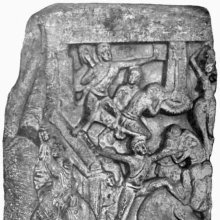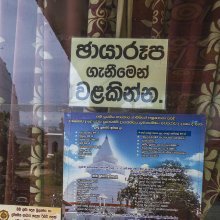Angulimala, Aṅgulimāla, Angulimalaka: 3 definitions
Introduction:
Angulimala means something in Buddhism, Pali, Hinduism, Sanskrit. If you want to know the exact meaning, history, etymology or English translation of this term then check out the descriptions on this page. Add your comment or reference to a book if you want to contribute to this summary article.
Images (photo gallery)
In Buddhism
Theravada (major branch of Buddhism)
Source: Pali Kanon: Pali Proper NamesA robber who was converted by the Buddha in the twentieth year of his ministry, and who, later, became an arahant. His story appears both in the Majjhima Cy., 743ff., and in the Thag. Cy., ii.57ff. The two accounts differ in certain details; I have summarised the two versions.
He was the son of the brahmin Bhaggava, chaplain to the king of Kosala, his mother being Mantani. He was born under the thieves constellation, and on the night of his birth all the armour in the town shone, including that belonging to the king. Because this omen did no harm to anyone the babe was named Ahimsaka. The Thag. Cy. says he was first called Himsaka and then Ahimsaka. See also Ps. of the Brethren, 323, n.3.
At Takkasila he became a favourite at the teachers house, but his jealous fellow students poisoned his teachers mind, and the latter, bent on his destruction, asked as his honorarium a thousand human right hand fingers. Thereupon Ahimsaka waylaid travellers in the Jalini forest in Kosala and killed them, taking a finger from each. The finger bones thus obtained he made into a garland to hang round his neck, hence the name Angulimala.
As a result of his deeds whole villages were deserted, and the king ordered a detachment of men to seize the bandit, whose name nobody knew. But Angulimalas mother, guessing the truth, started off to warn him. By now he lacked but one finger to complete his thousand, and seeing his mother coming he determined to kill her. But the Buddha, seeing his upanissaya, went himself to the wood, travelling thirty yojanas, (DA.i.240; J.iv.180) and intercepted Angulimala on his way to slay his mother. Angulimala was converted by the Buddhas power and received the ehi bhikkhu pabbajja (Thag.868-70) while the populace were yelling at the kings palace for the robbers life. Later, the Buddha presented him before King Pasenadi when the latter came to Jetavana, and Pasenadi, filled with wonder, offered to provide the monk with all requisites. Angulimala, however, had taken on the dhutangas and refused the kings offer.
When he entered Savatthi for alms, he was attacked by the mob, but on the admonition of the Buddha, endured their wrath as penance for his former misdeeds.
According to the Dhammapadatthakatha (iii.169) he appears to have died soon after he joined the Order.
There is a story of how be eased a womans labour pains by an act of truth. The words he used in this saccakiriya (yato aham sabbannutabuddhassa ariyassa ariyaya jatiya jato) have come to be regarded as a paritta to ward off all dangers and constitute the Angulimala Paritta. The water that washed the stone on which he sat in the womans house came to be regarded as a panacea (M.ii.103-4; MA.747f).
In the Angulimala Sutta he is addressed by Pasenadi as Gagga Mantaniputta,
Theravāda is a major branch of Buddhism having the the Pali canon (tipitaka) as their canonical literature, which includes the vinaya-pitaka (monastic rules), the sutta-pitaka (Buddhist sermons) and the abhidhamma-pitaka (philosophy and psychology).
Mahayana (major branch of Buddhism)
Source: Wisdom Library: Maha Prajnaparamita SastraAṅgulimāla (अङ्गुलिमाल) is the name of a Brāhmin mentioned in the 2nd century Mahāprajñāpāramitāśāstra chapter 39. Aṅgulimāla, son of the Brāhmin Bhaggava, chaplain of king Pasenadi of Kosala, studied at the university of Takkasilā and soon became the favorite of his teacher. But the latter suspected him of having failed to respect his wife and demanded fees of a very special kind from his disciple: a thousand fingers cut from the right hand of a human. To acquit himself of his debt, the young man lay in ambush in the Jālinī forest at Kosala, killed all those who tried to cross through it, cut off a finger from each corpse and from the cut fingers he made a garland which he wore around his neck. Hence the nickname Aṅgulimāla, meaning ‘Finger Garland’.
Notes: Quite a body of literature has grown up around Aṅgulimāla, but the main source remains the Aṅgulimālasutta in Majjhima. Aṇgulimala occupies an important place in the Pāli commentaries. In the neighborhood of Śrāvastī, a stūpa marked the place where Aṅgulimāla was converted. This monument was mentioned by the Chinese pilgrims Fa hien and Hiuan-tsang.

Mahayana (महायान, mahāyāna) is a major branch of Buddhism focusing on the path of a Bodhisattva (spiritual aspirants/ enlightened beings). Extant literature is vast and primarely composed in the Sanskrit language. There are many sūtras of which some of the earliest are the various Prajñāpāramitā sūtras.
Languages of India and abroad
Sanskrit dictionary
Source: Cologne Digital Sanskrit Dictionaries: Edgerton Buddhist Hybrid Sanskrit DictionaryAṅgulimāla (अङ्गुलिमाल).—(= Pali id.), name of a brigand converted by Buddha: Avadāna-śataka i.148.9.
Sanskrit, also spelled संस्कृतम् (saṃskṛtam), is an ancient language of India commonly seen as the grandmother of the Indo-European language family (even English!). Closely allied with Prakrit and Pali, Sanskrit is more exhaustive in both grammar and terms and has the most extensive collection of literature in the world, greatly surpassing its sister-languages Greek and Latin.
See also (Relevant definitions)
Starts with: Angulimala Paritta, Angulimala Pitaka, Angulimala Sutta.
Full-text: Himsaka, Ahimsaka, Silesaloma, Jalinavana, Jenta Purohitaputta, Mantani, Gagga, Angulimaliya Sutra, Makhadeva, Kammasapada, Pancavudha Jataka, Bhaggava, Sutano Jataka, Jayaddisa Jataka, Paritta, Takkasila.
Relevant text
Search found 21 books and stories containing Angulimala, Aṅgulimāla, Angulimalaka; (plurals include: Angulimalas, Aṅgulimālas, Angulimalakas). You can also click to the full overview containing English textual excerpts. Below are direct links for the most relevant articles:
The Buddha and His Disciples (by Venerable S. Dhammika)
The Book of Protection (by Piyadassi Thera)
Bihar and Eastern Uttar Pradesh (early history) (by Prakash Narayan)
The Buddha and the Others < [Chapter 4 - Social Process, Structures and Reformations]
Gotta (lineage affiliation) < [Chapter 4 - Social Process, Structures and Reformations]
The Catu-Bhanavara-Pali (critical study) (by Moumita Dutta Banik)
Aid seeking < [Chapter 1 - Introduction]
Different types of Discourse < [Chapter 1 - Introduction]
Efficiency of Paritta (Buddhist protecting charms) < [Chapter 1 - Introduction]
Anguli Mala < [October – December, 1999]
Buddhism in Andhra – Its Arrival, Spread and < [July – September, 1994]
Buddha and Asoka < [July – September, 1994]
Maha Prajnaparamita Sastra (by Gelongma Karma Migme Chödrön)
Appendix 3 - The story of Aṅgulimāla < [Chapter XXXIX - The Ten Powers of the Buddha according to the Abhidharma]
Preliminary note (1): The navāṅga < [Part 2 - Hearing the twelve-membered speech of the Buddha]
IV. The knowledge of the degree of the moral faculties (indriya-parāpara-jñānabala) < [Part 2 - The ten powers in particular]

